|
|
|
Sort Order |
|
|
|
Items / Page
|
|
|
|
|
|
|
| Srl | Item |
| 1 |
ID:
123338
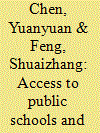

|
|
|
|
|
| Publication |
2013.
|
| Summary/Abstract |
A significant proportion of migrant children in China are not able to attend public schools for the lack of local household registration (HuKou), and turn to privately-operated migrant schools. This paper examines the consequences of such a partially involuntary school choice, using survey data and standardized test scores from field work conducted in Shanghai. We find that migrant students who are unable to enroll in public schools perform significantly worse than their more fortunate counterparts in both Chinese and Mathematics. We also use parental satisfaction and parental assessment of school quality as alternative measures of the educational outcome and find similar results. Our study suggests that access to public schools is the key factor determining the quality of education that migrant children receive.
|
|
|
|
|
|
|
|
|
|
|
|
|
|
|
|
| 2 |
ID:
173459
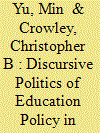

|
|
|
|
|
| Summary/Abstract |
This article explores the discursive functioning of education policies, bringing into consideration community perspectives regarding policy enactment in contemporary China. With the intention of building upon ongoing discussions surrounding both the conceptions and purposes of policy sociology, we critically analyse policies directly related to the education of migrant children living in and around China's largest urban centres, with a specific focus on those implemented in Beijing. We emphasize two important aspects that previous studies of China's education policies have tended to underplay given their focus on social-economic perspectives. The first argument is that education policies have an underlying agenda that extends beyond that of simply addressing the educational needs of migrant children – evidenced through the discursive functions of policy texts. The second argument is related and seeks to raise questions about who is best served by these policies and for whom these policies are intended.
|
|
|
|
|
|
|
|
|
|
|
|
|
|
|
|
| 3 |
ID:
171087
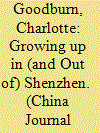

|
|
|
|
|
| Summary/Abstract |
Extensive research has shown that rural-to-urban migrant children in China face significant barriers to an urban public primary school education and often end up in poor-quality, migrant-run private schools. However, much less is known about what happens after children leave junior high school. This article therefore draws on two rounds of interviews with migrant children educated in Shenzhen, in 2008–9 and then in 2015–16, to examine in detail their experiences of schooling and labor-market entry. It identifies four distinct pathways of education—state vocational school, private migrant secondary school, state academic high school, and return to the countryside for further schooling—and suggests that these educational routes all ultimately lead to the same endpoint: regardless of pathway, aptitude, financial investment in education, and earlier career aspirations, migrant youths are channeled into low-skilled urban service work. This is in marked contrast to the hopes of parents that their children will achieve upward mobility through investment in education. This article analyzes the multiple reasons for the depressing uniformity of outcomes and the crucial role of state policy at both the central and local levels in perpetuating migrant disadvantage.
|
|
|
|
|
|
|
|
|
|
|
|
|
|
|
|
| 4 |
ID:
139555
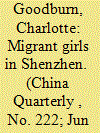

|
|
|
|
|
| Summary/Abstract |
This paper examines the impact of rural–urban migration on primary school-age migrant girls in China, providing important data on this unexplored group as well as drawing several larger conclusions about the evolving relationship between migration and women's autonomy. Much recent literature has focused on Chinese young unmarried women migrants. However, there has been no attempt to distinguish the effect of migration on children by gender, and little research on the “new generation” of married women migrants. This paper focuses on two aspects of migrant girls' well-being, education and migration satisfaction, and compares girls' assessments with those of their parents, particularly their mothers. It analyses differences between the views of both girls and parents, arguing that specific parental concerns about daughters shape girls' futures in ways that do not apply to migrant boys. A further, broader, implication of this analysis is that certain benefits of migration, previously thought to apply exclusively to single women, extend also to married women, influencing mothers when forming goals for their daughters' futures.
|
|
|
|
|
|
|
|
|
|
|
|
|
|
|
|
| 5 |
ID:
159050
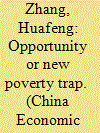

|
|
|
|
|
| Summary/Abstract |
Despite its rapid economic growth, China has never managed to reduce its rural-urban divide with its reforms and marketization of the economy. The huge gap between urban and rural education is embedded in the disparity in educational investment, children's educational attainment, school quality and the returns to education. Migrant children move with their parents to urban cities to pursue a better education. However, the Chinese household registration system (hukou system) limits migrant children's rights and access to basic education in the cities. Will migrant children benefit from a better-quality education in the cities, or will they continue to be constrained by their hukou registration? Will the large-scale internal rural-urban migration provide the opportunity to reduce rural-urban education inequality in China, or will it merely create a new education-poverty trap? Based on publicly available large-scale survey data (RUMiC), this paper applies logistic regression and survival analysis to illustrate the new education-poverty trap imposed on migrant children by the institutional constraints and hierarchies in children's education, created by the Chinese household registration system in Chinese cities.
|
|
|
|
|
|
|
|
|
|
|
|
|
|
|
|
| 6 |
ID:
169795
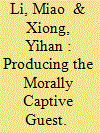

|
|
|
|
|
| Summary/Abstract |
To promote a prosocial conscience and behaviour, gratitude education has long been perceived as an effective intervention in formal schooling. Built upon the Foucauldian account of the mutually constitutive relationship between knowledge and power, this paper investigates how an urban school for largely poor and low-income children of migrant workers in Beijing constructed and transmitted knowledge and discourses on gratitude. The authors argue that the students are positioned as what we term “morally captive guests”1 who possess an inferior position in the moral life compared to urbanites, and who are perceived as an instrument for attracting resources and attention to the lower-ranked school. This schooling reproduces extant class relations, whereas the student resistance questions practices of graduating citizenship and educational inequalities.
|
|
|
|
|
|
|
|
|
|
|
|
|
|
|
|
| 7 |
ID:
105854
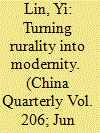

|
|
|
|
|
| Publication |
2011.
|
| Summary/Abstract |
Drawing upon fieldwork conducted in a public school of largely migrant children in suburban Xiamen, south-east China, this article first looks into the formation of class lines between people with different backgrounds - migrant, urban or rural - against the suzhi jiaoyu programme of the school. This programme particularly targets the rural populace with a carefully and specifically selected curriculum and quantifiable techniques, in order to turn them into the self-individuated and homogenized subjects of China's modernization project. However, this article also argues that the coercive concept of suzhi has revealed internal contradictions that render any attempt at consensus on what plural qualities constitute capital Q Quality self-contradictory and ultimately less productive. Lastly, it suggests that suzhi may be better understood as an ever-ongoing project of meaning making that aims to form a body of knowledge in China's exploration of new paradigms of governance.
|
|
|
|
|
|
|
|
|
|
|
|
|
|
|
|
| 8 |
ID:
153637
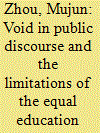

|
|
|
|
|
| Summary/Abstract |
Because of the huge impact of the hukou system (户口制度) on the allocation of educational resources in China, migrant children’s access to schools has long been circumscribed. Since 2009, a group of migrant parents in Beijing has been involved in a movement demanding their children’s right to sit for the college entrance exam in the city. Using ethnographic methods, this article reviews how the idea of equal education was contested among four groups: (1) liberal intellectuals as the leaders of the movement; (2) middle-class migrant parents as the major activists; (3) working-class migrant parents as the subjects for mobilization; and (4) participants in counter-movements. Despite the involvement of liberal intellectuals that has helped the movement make an inclusive claim, the movement has largely remained parochial, and to some extent it even served to reinforce inequality in China’s education system. I use the equal education movement as a case to reflect upon the ‘boundary pushing’ approach in studies on China’s public sphere, and contend that researchers should pay more attention to the internal power dynamics of social movement.
|
|
|
|
|
|
|
|
|
|
|
|
|
|
|
|
|
|
|
|
|